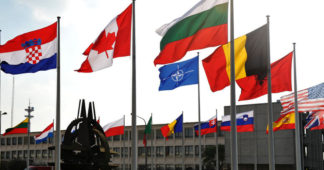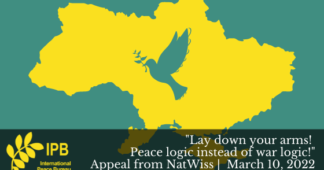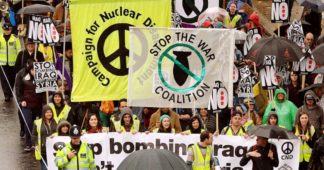Thesis Paper of the (German) Peace-Left Initiative (4.4.2023): Why the peace movement is not “open to the right”
The unifying bond of the peace movement is the criticism of militarism and war. On this basis, it offers space for people in their own colorful variety of attitudes and/or convictions, including, for example, conservative or communist, Christian or atheist, anarchist, bourgeois-liberal, ecological, pacifist, and many others. Since its emergence as a “modern” peace movement at the beginning of the 20th century, it has been politically persecuted by the warmongers and militarists, defamed as traitors to the fatherland, as remote-controlled or fifth column of the “enemy” of the moment, as naive, refusing to face reality, incapable of politics. The defamation as “right-wing open-minded” (including “lateral thinkers” or “anti-Semites”) is more recent, but it certainly has an effect. We deal with it in these theses.
1 The peace movement as a broad social alliance has always been characterized by a variety of different analyses and opinions on issues relevant to peace policy. However, controversies – such as the current evaluation of the history and background of the war in Ukraine – do not stand in the way of common, concise demands.
2 The peace movement has always been exposed to defamation. What is new compared to the past is that this is being done by forces from organizations that were previously rooted in the peace movement. This provokes deep contradictions within large member organizations, since people who reject stigmatization and exclusion are still active in them. The same applies to important partners of the peace movement, such as trade unions or church circles.
3 The background to this development is the enormous pressure exerted by the ruling elites and their media on peace-loving forces of all kinds. They are frighteningly narrowing the space for debate and threatening opinions that deviate from the mainstream with fines and bans from the profession.
4 From NATO’s perspective, the West wants and needs to win the war in Ukraine. At the beginning of the war it may have been different, but in the meantime the NATO hawks and their military industrial complex are concerned with maintaining their dominance in the world; they want to break, or at least stop, the (change of) times from a unipolar to a multipolar world. This is the reason for their hostility and irreconcilability toward all forces that rely on diplomacy, compromise and disarmament.
5 In German politics, the turning point already took place in 1999, when the Greens and the SPD broke with pacifism and/or military restraint and became bellicose in the Yugoslav war. The currently escalating bellicism also shows parallels to the war hysteria fomented in 1914, when a historically proven anti-war sentiment in the population could be turned around by politics and intellectual elites. Even then, anti-Russian sentiments played a major role. It was Karl Liebknecht who was able to encourage a countermovement to this with his call “The main enemy stands in our own country.”
6 Currently, left and right are being dismantled as political coordinates by a totalitarian opinion mongering of the political “center. In the meantime, almost any behavior that deviates from the norm is considered “right-wing.
7 For many people who have (re)politicized themselves in recent years – especially as a result of the federal government’s Corona policy and its claim to absoluteness – the term “left” no longer appears to be enlightening, but rather denunciatory. “Left” is increasingly perceived as a synonym for content-less demarcation, as name-calling and insults by supposed “rightists.” On the right is the view that war and militarization are necessary and sensible, on the right is thinking in terms of enemy images, the opinion that different groups of people and individuals have different values and rights, and on the right is authoritarianism, downward kicking and upward fawning.
8 We see ourselves as leftists in the peace movement; not in order to distinguish ourselves from others, but rather to make ourselves recognizable. For us, principles of peace politics are: anti militarism, international solidarity and an anti-fascism that takes as a basis the historical circumstances that led to the handover of power to the Nazis in 1933 and deciphers them in their present-day manifestations. In our commitment to peace we also look at property and power relations, at geostrategic interests, we analyze social equality or inequality in this country and worldwide. For us, peace and democracy and human rights, peace and the preservation of the natural foundations of life belong together.
9 Those who position themselves on the left should stand by it. Those who give up leftist positions in order to get into the mainstream pass the ball to those who hold racist and militaristic positions, but use strategic-tactical peace rhetoric because of their followers or other political opportunism.
10 We demonstrate on given occasions with all people who honestly share the respective call and are committed to offering a podium only to such forces. We are aware that the assessment of sincerity is more a matter of historical consciousness and political experience than of verification.
11 We resolutely oppose a “demarcationitis” that is carried out without reference to our own peace policy principles. Terms like “right-wing open-mindedness” (also “lateral thinker” as a swear word or the frivolous political deathblow “anti-Semitism”) do not reflect left-wing thinking. They are inventions from the right to divide the movement. However, they only develop their effect when they are not only attached to the movements “from the outside”, but can be based on an “inner witness”. This in turn often works with lies, such as falsified quotes or quotes taken out of context, or by arbitrarily and falsely attributing events or statements to each other that have nothing to do with each other.
12 We want to judge organizations and parties according to their programs and not according to the appearances of individual protagonists who are worthy of criticism. All those who sincerely stand up for peace are welcome. But those who think they have to turn peace rallies into right-wing assemblies should stay at home.
13 We want to judge individuals who are portrayed as “controversial” or “open to the right” according to the totality of their statements and fight for truthful portrayals. We consciously seek cooperation with forces that are taking a “new” approach to the peace question. We want to understand their political socialization and find argumentative approaches for an open and honest discussion with them.
14 People who do not know their history are doomed to repeat it. We relate this to key years in German history such as 1914 and 1933. We ourselves therefore see a corresponding historical awareness as a key element of our enlightenment approach. Contact: info@frieden-links.de; Info: https://frieden-links.de
We remind our readers that publication of articles on our site does not mean that we agree with what is written. Our policy is to publish anything which we consider of interest, so as to assist our readers in forming their opinions. Sometimes we even publish articles with which we totally disagree, since we believe it is important for our readers to be informed on as wide a spectrum of views as possible.











